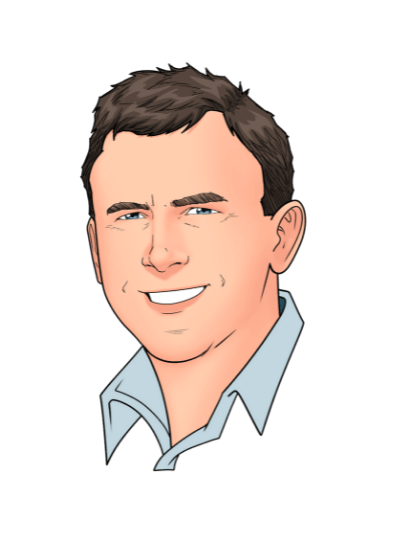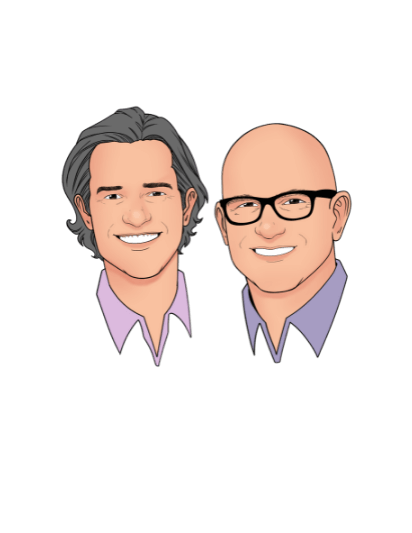
78
Episode 78 44 mins
Hire for Curiosity Over Experience: How Willingness and New Perspectives Lead to Transformational Results
Hamish Thomson, Author of "It's Not Always Right to Be Right"
00:00
00:00

“Curiosity and willingness are greater than experience. When you recruit on that basis, it's really good because it makes you seek out those who are incredibly curious. And as long as I've got a passion and a willingness to learn new things, often that can be actually more valuable than experience.”
In this episode
As leaders, transformation and great results are what we strive for. But what do we need in order to get there?
Hamish Thomson was the former Regional President and Global Brand Head for Mars Inc and former Senior Marketing and Sales Lead for Reebok International. Today, Hamish is the Author of ‘It’s Not Always Right to be Right’.
In today’s episode, Hamish shares why hiring people who think exactly like you is a mistake and why you need diversity of thought on your teams.
We also learn about the power of curiosity and why willingness and new perspectives can lead to transformational results.
Tune in to hear why leaders need to honour the past, respect the present and provide hope for the future.
Like this episode? Be sure to leave a ⭐️⭐️⭐️⭐️⭐️ review and share the podcast with your colleagues.
04:00
Don’t hire people who think like you
12:00
C + W > E
15:00
Stop being right
26:00
Provide hope for the future
29:00
Don’t be a drain
42:00
The 98% rule for feedback
Resources
- Connect with Hamish
- Read Hamish’s book ‘It’s Not Always Right to be Right’
Transcript
Aydin Mirzaee (Fellow.app) 00:00
Hamish, Welcome to the show.
Hamish Thomson 02:38
Aydin, great to be with you.
Aydin Mirzaee (Fellow.app) 02:40
There’s a lot of stuff that we’re going to talk about today. I mean, you have such an interesting career, you’ve worked at companies like Mars Inc. and Reebok, a lot of great brands, you’re the author of it’s not always right to be right, which we’re going to dig into quite a bit. Why don’t we start with one of my favourite questions, which is, you know, you’ve been a leader for a long time? And if we have if we could rewind to those early days when he first started leading teams. Do you remember some of the mistakes that you made back then?
Hamish Thomson 03:12
Yeah, I think so. No, I am. I love the concept of actual mistakes and your best mistakes. And I think we all talk around, but they’re exceptional cultures, exceptional companies. They are those who embrace risk-taking and mistakes along the way. So I think probably from my leadership journey when I first got within sort of the CEO type roles, and this was back within, regularly confectionery game was heading up the Pacific region. And when I suddenly took on this leadership team, I’ve not as I probably jumped into rookie mistakes overall. And probably the first mistake was I started to hire people who thought exactly like me, and I love diversity. I love sort of different perspectives and newness, but I am in well, not intentionally, I had this bias of hiring people who thought like me, and this probably the worst mistake for a leader is to have people who think like you and yes, people involved within that. So it’s something that consciously probably over the last 10 plus years of my CEO roles has encouraged me to get diverse sorts of views and thinking. And another one of them is that same team, which I think a lot of people make when they take on a leadership role. You try and get the team to love you. And there are all the Gallopin and engagement scores and you speak spend so much time on that, but it’s not around your team and your direct reports loving you. They have to do that. If they don’t get on with you. There are over relationships are the ones who are going to get hurt. But the real insight is you want your leadership team to start loving each other and Working, connecting and integrating within each other. And there was a classical schoolboy error. It wasn’t about me, it’s more around getting that team actually, in together. And those are the main ones. And I think probably the other mistake which I made, thinking that as a leader, I have to shelter, my team, remove a lot of that sort of stretch and panic. So difficult situations, I would always step up. And I would take that role along to be that sort of face where if you’re going to develop and stretch your team, you want them to have those crucial moments, those crucial conversations, you don’t want to micromanage, even if you think you’re doing it for the right reasons. So I’ve made a lot of those rookie errors. But if you didn’t go through them, you’re never going to learn and go that next stage,
Aydin Mirzaee (Fellow.app) 05:48
I must say that your rookie mistakes are very advanced-sounding mistakes. So I have to dig in quite a bit. There. They’re not typical, I like to micromanage a lot, or you know, some of the more surface-level mistakes, these are deep mistakes. So I have to ask you, how did you figure out that you were making the mistake of hiring people like yourself because that’s not an easy one to just uncover? Because when you hire it, such people? I mean, you might have a great time, you know, getting along and things like that, did you turn around and say, Hey, life is too good. I should hire people differently, or how did this happen?
Hamish Thomson 06:27
So I think it came about where I have always been, I’ve been very lucky because I’ve been part of exceptional businesses and exceptional cultures. And I’ve been fortunate to be reasonably successful in regard to results-wise over the years. And I think my discovery on that came that when I saw that new perspective, led to bigger transformational results, I started to seek that out. And I have this terminology around, everyone should be insatiably curious, and I had a great boss with the Asia Pacific called Samson suon. And Samson used to say your mind works like a parachute best when open. And I loved that. And when I started discovering that, when I had external connections, new perspective, an inside out sort of lens, ideas, opportunities, processes, new strategies, they were so much more valuable. And when you discover that it’s a little bit selfish, then I went on a real mission, how can I recruit people that are dramatically different from me, and that’s not only I’m a massive believer in diversity and inclusion, gender, in particular about cultural, different ways of thinking and approaches. And it’s not only those people who look different from you, they have to think differently from you. And it can be incredibly challenging. You get there from a group of sort of leaders around the table, and everyone’s got different views, and you do feel tension. But that goes back, and we’ll talk around that later in the book, it’s not always right to be right. It’s okay to have a different opinion doesn’t mean it’s right or wrong. It’s just different. So selfishly, I think I came to that conclusion, because it garnered me better results,
Aydin Mirzaee (Fellow.app) 08:22
You know, if I were to dig in, so you’re not talking about just some more surface-level things, which are, you know, for example, like, I tend to be good at marketing, let’s hire someone that’s more finance minded, you’re looking for maybe diversity of background, people with, you know, different sorts of coming from different industries, you’re just like, you can kind of tell that they would bring a different point of view to the equation. So this isn’t like the sort of thing that I would imagine that you know, the first-year manager realizes that, oh, I should do this. This is something that like, as you build larger and larger organizations, you start to understand that, like, when you have that diverse opinion set, it makes a big difference and allows for, I guess, bigger, bigger takeaways.
Hamish Thomson 09:09
Yeah, I think you do develop that inside over time. But equally, you start to realize it’s a fair bit more fun. And I’ve always been, my sort of perspective is when I hear an idea of I think I’m going off on on the right direction. There assume some people when they say, we’re going left, normally, I’d think why are they going left? But some people think curious mindset where I think Why am I going right? And it just, it’s a real fun element to start to value opinions of others ahead of yourselves and you seek to understand before being understood. So I think it’s it’s enjoyable, it’s valuable, opens up a new perspective. But equally, I’d not say that. I think the new generation of leaders coming through, I think they are more connected, they’re more integrated. The more global citizens. I know it’s a little bit of a cliche, but the mind thinks wider than probably my generation as well. So I would even say at a young age starting even that management level, show your curiosity and perspective. And I think it’ll open a wide range of doors for you.
Aydin Mirzaee (Fellow.app) 10:20
Yeah, no, that makes a lot of sense, and so to dig into the other one, you know, I have a friend who runs a fairly large company, maybe, you know, 1000 1000 people that work there. And, you know, the thing that I learned from him was that he said that one of the things that’s hard about scaling teams is you know, people don’t realize that you have to make the teams work well together. And that was one of the like, you have to be this orchestrator and get your executive team, to function well together. And it seems like this is very interesting, you know, point that you’re making, if I have a crack this like, yeah, you can get the team to love you. But actually, that’s not the most important thing. I’m just curious, like, what are some things that you can do to help your team, you know, gel better together, and to hit some of those crucial moments?
Hamish Thomson 11:15
Yeah, I think the very first thing on teams, if you give them a shared purpose, and a shared agenda, I think they’ll work well together, there’s nothing worse. And I’ve hope your listeners will find that you’re encouraged within the business to have relationships and to network, that’s all very well, well and good, but you’re unlocked team potential by giving people a shared purpose and a shared agenda to work on. And equally, I think, as a leader, if you encourage your reward, and recognize those people who are good at integrating and connecting others, so even if you put them on a project, and the technical and functional, know-how is incredibly limited, that’s okay, as long as they are the best people leaders, integrating and pulling people together. Because when you do get alignment, or cohesion behind a shared purpose, it is pretty hard to stop. So I think that’s the sort of a real sort of key element. And the other one, Aydin, which, over the years, I’ve changed my recruitment philosophy. So it used to be around typical and functional master class, I want that experience. There’s a concept I was exposed to a few years back, and it said, C plus W is greater than E. And that is curiosity and willingness are greater than experience. When you recruit on that basis, it’s really good because it makes you seek out those people who are incredibly curious. And as long as I’ve got a passion and a willingness to learn new things, often that can be actually more valuable and experience. But you can’t override the importance of experience. But it’s just a completely different way to get new people into your team.
Aydin Mirzaee (Fellow.app) 13:00
You know Curiosity is such a useful trait, one of my friends who I consider to be a great parent, says that you know, the best thing that I can do is help my kids be more curious. How do you figure it out? If someone has that curiosity? And maybe willingness is something that you can kind of figure out if they’ve done a lot more initiative, but how do you know if someone is genuinely a curious person?
Hamish Thomson 13:28
Like you find out pretty quickly once? Once you get to know them? Probably? It’s, it may be unfortunate in some ways, but if I think around big strategic planning sessions and days, and it doesn’t matter what level you are, you jump yourselves in a room you surround yourself with people and the best leaders are those who encourage everyone’s opinion to count. So it’s an egalitarian approach. Everyone’s involved with them thus, you soon find out within those sessions, who’s got limiting beliefs. And unfortunately, often the people with the most limiting beliefs have been successful over past years. So they believe they don’t need to change and they don’t need to do anything different going forward. It’s really obvious when you’re in that situation where convergent-divergent sort of views, new adjacencies, category, segments, geographies you can go after, and people are talking around how to reinvent the business constantly stay ahead of the curve. And there are certain people within that room and invariably happens, who will have limiting beliefs can be done hasn’t been done. Historically, these have been the issues. No, we haven’t got the capabilities or mindsets. And you find that out very quickly. And equally, I think also there’s a negativity that radiates amongst the wider group as well. When you have those people who don’t have curiosity, again, going back to their recruitment philosophy, there are ways you can make Asia asked questions within interviews for Curiosity has quite interesting I was in their Facebook hit offers several years back. And they had a great quote on one of their motivational posters and said, Don’t confuse motion for impact. And I just absolutely love that a lot of people go through the process. But some so many people are taught theory and intellectual stimulation that they can translate that into action. And, again, great companies will have a way of actually interviewing for impact directly upfront. So I think it becomes very obvious. And it’s not saying those people are wrong, but they just may not be right for your culture. And if your company wants a culture of the respective, outward leans connectivity, which I think is crucial for a breakthrough, you’ll find out pretty quickly who’s right and who’s not right for the business.
Aydin Mirzaee (Fellow.app) 15:57
I wanted to talk about your book. So why don’t we start with this concept of Stop Being Right? We all know people that have to be right, often, maybe some of them we know very personally, what drove you to write this book,
Hamish Thomson 16:16
It’s fascinating, it’s similar within North America, but within Australia, the last one to two years have been going down the lockdown path. And I think my kids and my partner Mary have told me it’s not always a beat, right to the right more times than maybe I have within my CEO gigs. So it’s personal. As well as prevalent within the business, I suppose. I was the type of leader I was when I first started. And I think a lot of leaders are like this, I thought the leadership was all about being right, in every debate, discussion, dialogue, that I’d have a go into wanting to win, and always thought there’s going to be a winner. And I’ve always thought there’s going to be a loser. And it was intellectual sparring. And it was good fun. And I was okay, just like, probably most of your sort of viewers were reasonably competitive and results-oriented. And I did okay, and success was alright. But then when you do reflect, you start to realize that too restrictive of thinking, which we just talked about your relationships that you develop when you are right, are very short-term, and one-off. Now my belief is the best breakthrough results come when you have stage two and stage three of the relationship. That’s when the depth and the trust and the vulnerabilities were displayed. That’s your massive opportunity. But when you’re right, your relationships are not enduring. They’re not mutual, and they’re very short-term. And probably that the next one all matters when you’re always right. your teams and your direct reports. They don’t challenge you. They don’t put input towards you. And they don’t develop because why would they every time they get into a discussion with you, they’re always going to lose. And what that leads to is inertia. So they’re resigned to thinking there’s no bloody point putting this in. So it can be incredibly restrictive. So over time, best leaders are found and I’ve certainly changed my sort of stats, you’ve got to be humble, concede, show with total vulnerability, humility, that, hey, I’ve got this entirely wrong change where you need to, and importantly, start to give a lot more freedom and autonomy to others, even if they do things that you don’t necessarily think is the right way. Doesn’t matter, helping empower them along the way. So it’s something I’ve learned along the way through, some harsh experiences where I thought it was right to be right. It’s not always the case, as your partner will tell you. Yeah,
Aydin Mirzaee (Fellow.app) 18:54
yeah, that makes a lot of sense. It’s very interesting how you talk about if you’re right all the time, you will develop short term and almost like more topic, like basically surface-level relationships. And like some of the, I guess, like deeper relationships are to be formed when you’re vulnerable when you have these sorts of, you know, I love the term you use crucial moments that make your relationships on a deeper level. One of the things that come to mind is we recently had Colin Briars former Amazon VP, you know, on the show, and one of the Amazon leadership values is leaders or right often or something like that. I may be butchering it a little bit, but you’re not saying that, like you shouldn’t try to be right or that, you know, as a leader, you shouldn’t develop great judgment. That’s not what you’re saying here.
Hamish Thomson 19:49
No, 100% not and there’s in any organization, there’s decision-making hierarchy. So you got to make a decision at the end of the day and do you Want to make the right decision? 100% you do, you have to be curious enough, and people have to appreciate that they have been heard. And then when you actually communicate back your decision making, even if your decision is not the recommendation of somebody else, as long as you clarify, and they believe they’ve been heard and explain your rationale behind your decision, the context, the content, people accept that. And I’ve always thought it’s important to be 100% authentic within there. And I think when we, you know, we may or may not talk around this, but there’s a methodology that when communicating back tough decisions, that talks around, you honour the past. And that’s important. A lot of leaders, when they come in new jobs that don’t honour the past, they perceive or have something chronic, you respect the present because those people are within operational detail at the moment, it’s difficult for them, and you’re going to give them respect, but you give them hope for the future as well. And those three elements, if you’re making decisions that are even different from others, if you follow that path, people at rule respect, that decision might not agree with it, but they’ll respect and understand why you made that.
Aydin Mirzaee (Fellow.app) 21:16
Yeah, you know, I would love to dig into this a bit more. You know, I think this applies to anybody who is taking on a new team because not all of us have the luxury of just, you know, let’s hire our people. And we’re gonna choose exactly what we want. And sometimes we, we adopt a team, we get parachuted into a new organization, if you’re like me had a company, once that was, was acquired by another company, and you have new leadership, there are many, many cases where you run into this. So I’d love for you to just give us an example of how to do this well. So say that you, you know are in this situation and you adopt a new team, and you have to run your playbook.
Hamish Thomson 21:59
Okay, I’ll give you an example. What happens is that probably the best one is when you come into a new team or your new leader, or you take something on, it’s been difficult. If it’s in a turnaround situation, the businesses are in a world of pain. And what they’ve gone through in the past has been bloody hard. It’s been difficult, and they haven’t been successful. So often, a new leader will come in and quite rightly, with conviction, they’ll say, this is the direction we’re going down. Now, unfortunately, senior managers and senior leaders are often the worst offenders, they’ll come in, and they will give no respect to what’s happened in the past. Now, regardless of the situation, people make the right decisions, with the best information that they have, everyone has got good intentions on that. And as soon as you come in as a new leader, and your bag and sort of talk around baggage about what you did wrong in the past, you’re immediately putting off every single person who is associated with that within the past. So honouring the past, talking around appreciative inquiry about the good things that did take place, because there were good things, and then equally respecting the present. So again, it’s coming and talking around a turnaround situation. As soon as you bad mouth of x, y and z. This is what you guys are doing wrong. You need to do X, Y and Z it’s unacceptable. I guess it’s conviction leadership. But again, people walk away disengaged, it’s as though they don’t understand them and are operationally immersed within that.
Aydin Mirzaee (Fellow.app) 23:37
Just to dig in a little bit more. And this may be like a very novice question here. But when are you talking about what is the difference, like very like tactically, between honouring the past and respecting the present, because presumably, they could be the same? So how do you distinguish between those two?
Hamish Thomson 23:55
I think when I talk about honouring the past, it’s around mainly strategic decisions in directions that were taken. So let’s say you decided to go with an A new geographical format. Let’s say you went with a new category adjacency that you took off within this direction, or even on an organizational design, you’re outsourcing as opposed to an internal approach. So those strategic decisions, that’s to me around honouring the past, and even if they turn out to be the incorrect decisions at the time, they were made with the right information, information possible. So you can’t dish that. Now, when I talk around respecting the present, there may be some sort of overlaps. But often people don’t realize when you come into a business, what are those day-to-day operational challenges that happen? My workload, the competitive element that I have, I may have a customer or a client who is not willing to be mutual and partner than that. So it’s very easy to come and believe that this is how it should be, you shouldn’t be doing this. And unless you respect those operational difficulties and help unblock those for people, I think it can be incredibly disengaging.
Aydin Mirzaee (Fellow.app) 25:18
Yeah, let’s talk about this last step, which is to provide hope for the future. So what are some effective ways to do that?
Hamish Thomson 25:27
And I’ve always thought on this, and I know there’s a lot of people talk around the why and the overall purpose but I’m purposely companies growing and more important not only regarding employee value propositions, people wanting to join a business, that equally now, consumers clients are wanting ethically sustainable purposely of companies. So the importance of providing hope for the future and ambition, it’s really important to deliver on the business. Unfortunately, what I see happen too often is constant change. And that’s okay. But a change in strategic direction, hopping from one area to another. And equally, a lot of time, there’s organizational design revamps. So structural changes, departments, redundancies, etc. And when you go through that turmoil of change, it’s reality. But you need to provide hope that there is a good future, its vision-related, its purpose-related meats, your values, etc. And people believe that there’s confidence going forward that we’re heading in the right direction. And even if that direction will pivot and change over time, that’s okay. But unless you provide hope for the future, there’s no way people can go through a change agenda and feel as though it says hitting you with them in the right direction. And just a very small thing, I think one of the things that I get frustrated around with leaders, they jump into trying and doing continuous organizational design changes. So a revamping structure, and there’s nothing worse than consistent changes within OD, if you’re going to do an organizational design change, do it once do it big and do it at a collectively at the same time, as opposed to continuous run because of uncertainty for anyone self-included. It’s never a nice feeling within that. So it’s a mistake, I think a lot of people jump into thinking oh, just to change and pivot here can be very dangerous and OD change.
Aydin Mirzaee (Fellow.app) 27:40
[AD BREAK BEINGS] Here, they’re just a quick note, before we move on to the next part, if you’re listening to this podcast, you’re probably already doing one on one meetings. But here’s the thing, we all know that one on one meetings are the most powerful, but at the same time, the most misunderstood concept in practice and management. That’s why we’ve spent over a year compiling the best information, the best expert advice into this beautifully designed 90 Plus page ebook. Now don’t worry, it’s not a single-spaced font, you know, lots of tax, there’s a lot of pictures, it’s nice, easily consumable information, we spent so much time building it. And the great news is that it’s completely free. So head on over to fellow dot app slash blog to download the Definitive Guide on one on ones. It’s there for you. We hope you enjoy it. And let us know what you think. And with that said, let’s go back to the interview.[ AD BREAK ENDS] One thing that I also wanted to talk about you know as we talk more about you know, people on the team is you have this this this way of almost classifying types of behaviours to dream you know, people who are dreams and those that are radiators are free to elaborate on that. I don’t know if you would agree but it but I think like are there a lot of people that would classify themselves as being drains and, and so if nobody classifies themselves as being drains like how is it that we will be able to classify others in that way?
Hamish Thomson 29:17
I love this. I love the terminology. I started life Aydin, in London advertising. I was a copywriter, I was a terrible copywriter. So they quickly moved me on but this strange radiator’s concept is from one of the major sorts of advertising agencies and the whole element behind us is a drain. It’s exactly what a drain sounds like. They’re negative, pessimistic they have limiting views. They never see opportunity and the negativity radiates Well, negativity and fix right across the business. Now, we do all have drained moments. There’s no doubt around our personal life as well. However, I used to say There’s nothing worse as a leader than having a drain around you. There is it’s having a drain around your team. And it is something over time, I have made mistakes because haven’t moved drains on within the organization because they’ve been technically brilliant. But if they’re drained, I needed to move them out, there are probably three occasions where I was just too slow to act regarding moving in a drain out of them out of the business probably three to four occasions. Whereas a radiator, on the other hand, sees opportunity, they have a can-do attitude, they’re incredibly infectious, their energy levels are high. It’s a possibility mindset. Now, the one important thing to note, a radiator is not a Pollyanna and a Pollyanna will see the best in everything. A radiator can still be a challenger, a provocateur have Crucial Conversations. But every time they put that challenge across, they get into solution mode. And they are results-driven. They’re action-oriented on that. So I think it’s it’s important on it. And it depends on what type of culture you want to see as a leader. Some people are Okay, on that degree of negativity for the teams and organizations that I’ve learned, I want to lead, life’s too short to have too many sorts of drain moments around. So it’s a personal view that I put that philosophy way ahead of engagement way ahead of satisfaction, and is probably my number one focus within a business but equally agency partners as well. Do you want positivity?
Aydin Mirzaee (Fellow.app) 31:29
That’s super interesting. And I like that you also talked about making sure that the other sorts of organizations that you have relationships with that this is something that you look for as well, is there a way to figure this out during an interview process?
Hamish Thomson 31:57
I think it well, it probably comes back to that, you know, c plus W curiosity and willingness, you can, you can link that out. I think there are also opportunities you ask around what is the belief regarding where the organization will be or where the industry will be in X, X years time. So you’ll get that perspective element come out, you can also actually role-play regarding crucial conversations of what challenges they’re in if somebody within a challenge on a business turnaround or a realignment situation if they are very short term very negative regarding that approach. And also very silo-oriented, not looking to connect with a group, there’s probably sort of alarm bells that jump out. So I think there are ways to look, I once saw ahead of a telecom unit, the CEO, I know, within the UK, and he said his overall objective, every leadership team meeting that they had their objective as a CEO, but also his leadership team, everyone who walked into that meeting, had to walk out more energized and inspired before they walked in. And I just love that concept, the number of times I think over my career, and I’ve been at some great organizations. But when you walk out of some meetings, you feel incredibly deflated. You feel so you sort of just been sort of, you know, kept down, there are limiting beliefs that have been put through there. But that ability to energize and inspire people to possibility. It’s incredibly advantageous. James Allen from Bain consulting always talks about the importance of energy within a CEO and just resonates with me greatly.
Aydin Mirzaee (Fellow.app) 33:50
That, you know, the energy concept is, is very, very important. So, you know, as a senior leader, managing your energy state is super important. Would you ever, for example, cancel a meeting, if you just didn’t feel like if you were just having one of those, you know, being a drain type of days?
Hamish Thomson 34:12
Listen, we all have them, don’t we? That’s a great question. Yeah, I reckon I would, I’m just trying to think of I had, if I have, I haven’t gone. I’ve pulled out of a couple of market visits because I just was over. not overwhelmed. But I knew that I wasn’t going to inspire within those market visits because I had too many other things on my mind. I think probably as soon as this comes back around, I’ve got a philosophy of which I turned that life-work balance as opposed to work-life balance. Paul Polman from Unilever to that phrase, and it just resonates for me. I love work, but I know that I’m only at my very you’re best at work when I’m excellence in life unless those whole balance elements and you’re nowhere around that, you know, the bill, George sort of energy where you derive your energy from, but that importance of being at your best, unless you’re at your best, how can you actually derive their energy and inspiration to others, and the very best leaders no matter how challenged they are, no matter how busy they are, and you look at their agenda, and you almost sort of shudder and think, My God, how do I do that? They’re always composed, they don’t seem to have those off days. And they seem very much more balanced regarding their approach. And I think that’s because they have that excellence in life, as well as at work. And equally the great leaders. And this is one thing I’m very conscious of, I tell my direct reports, you have a responsibility to role model life-work balance to others. And when you see a boss, who is constantly stressed, constantly out of a family environment, constantly in a negative sort of mindset, it doesn’t inspire you to try and rise that corporate ladder. So as a leader, you have a role model to, I think, showcase lifework balance, and it’s okay if you live for work. That’s right. If you want to work 24 hours a day, no trouble at all, but you can’t show negative behaviours to those within the corporation.
Aydin Mirzaee (Fellow.app) 36:29
Yeah, no, I think that’s, that’s incredible advice. So talking about you, you mentioned the word agenda. And, you have a chapter in the book called who is writing your agenda? I’d love for you to tell us what that’s about?
Hamish Thomson 36:45
As I said, I’m from New Zealand originally. And there’s a great rugby coach that we had called Sir Steve Henson, and he’s got the concept called, you don’t need to lose to learn, but it sure helps. It is so true, though, isn’t every time you sort of lose or suddenly you, you go into a lot of reviews, you look for insight context, you know, content, etc. But how can you stay ahead of that curve? And everything that I try and do is and I don’t always I’m not always successful on it. But how can I control my agenda, right, my agenda, lead versus manage, fix before broken and get ahead of that curve? And it’s a difficult thing to be able to do. But I think it’s incredibly important for a leader to do and the best practical way. And my advice is you need to plan and think around your forward state. So what is the endpoint? What are your vision and mission? What are your strategic priorities, your key enablers? Your cultural dimensions? What do you want to achieve? And that next three to five years, and then start getting ahead of the agenda? So those capabilities and competencies that are going to be needed tomorrow? How do you start putting them in place today, and I think it’s a McKinsey study or amazing BCG. It said 90% of CEOs, global CEOs, believe there’ll be a major business disruption that will happen in the next five years, yet, they are only investing 10% of resources to currently get ahead of it. Now, something’s wrong with that approach. So my belief personally in business, you should be doing everything you can to get ahead of the curve, setting up new capabilities over investing within that taking on new segments or parts of the business, different ways of working processes, different partnerships to get ahead of that curve. So I take that pretty seriously.
Aydin Mirzaee (Fellow.app) 38:52
Yeah, and so when you’re operating as a CEO, like how much of your time you know, if you had to just bucket it is say forward-looking looking, you know, past one year versus looking at the current quarter.
Hamish Thomson 39:07
Yeah, it’s a tough balance. I mean, I, I don’t have a percentage, I’ll tell you what I’d like it to be. I think it should be 70 30 70% transformational and 30% transactional, so be on top of the business as opposed to in the business. It does fluctuate, you know, I’ve been at times it’s been completely reversed. The best way to do it is to surround yourself with very gifted people. Let them take those operational elements on. So that’s number one that I think if you get the right people, it allows you to step back and reflect. The second one is establishing upfront your strategic plan. Now a lot of people don’t do that strong enough but set the strategic direction where they’re going and I term have a strategy on a page and there are loads of templates for a purpose, simplicity and easy to follow strategies are incredibly appealing. Once you’ve got that, right, it allows you to actually step back and review and constantly focus on that. There are other elements like performance measures versus general measures. So in a leadership team agenda, you want to create your agenda around these performance measures doesn’t mean the general measures are not important. But you only talk around them when maybe three or four periods in a row. If they read scorecard, your look at them then but otherwise, you just pack that to the side and only focus on those real game changes, which forces your leadership agenda, to do. And probably the last one is a lever, which is hard. You’ve got to accept less perfection, which is hard if you’re quite a sort of diligent person, but it’s okay if these things don’t go 100%. Right. And you can’t jump in and micromanage. Even if you think there’s a better way of doing it. It goes back to not always being right to be right. That’s a tough one to accept. But giving that freedom, autonomy, spending your time coaching and empowering and developing as opposed to directing a micromanaging allows you to step back. But the one thing I have learned, not all leaders can do that. And that’s okay. It’s just a different capability set to the head.
Aydin Mirzaee (Fellow.app) 41:29
Yeah, no, that that is, that is incredible advice. And I think we have talked about so many different things. We talked about how you don’t need to lose to learn, but it does help. We’ve talked about, you know, hiring people, not like yourself, we’ve talked about stopping being bright, just so many different things. This is super wide-ranging, but and very insightful discussion. One of the questions that we like to ask all of the guests on the show is, for all the managers and leaders constantly looking to get better at their craft, do you have any tips or tricks or final words of wisdom that you’d like to leave them with?
Hamish Thomson 42:13
The main one was, I have this concept and belief that it’s the 98% rule. And when I talk around us, that means 98% of what you hear, particularly regarding feedback, let it go over your shoulder. And it’s only really the 2% that resonate with you. And the reason I say that is when you receive a lot of feedback in so many companies, we get it from all levels, it can be very overwhelming, and the danger of us people change who they are and their identity, and what you want to do with all feedback, etc. And even role modelling and inspiring to be like other leaders. You want to define yourself, but don’t change fundamentally your persona, and what appeals to you as a leader. And that’s to me is around being 100% authentic. So my main encouragement to everyone, and I’ll say consistently refine who you are, be very curious and open, but don’t fundamentally change because as soon as you do, and I’ve got a chapter book talks about the main use the smile, trying to be somebody that we’re not. It’s a really painful experience. But you just need to be your best. And Oscar Wilde got this great quote, aid, and I think it’s Be Yourself. Everyone else is taken. I just love that.
Aydin Mirzaee (Fellow.app) 43:40
Yeah, no, that’s amazing. You know, the book is it’s not always right to be right. We’ll link to it in the show notes. Hamish, thanks so much for doing this.
Hamish Thomson 43:50
Great to connect, Aydin. Thank you.
Latest episodes
-
Kim Scott, Bestselling Author of ‘Radical Candor’ and ‘Radical Respect’ on Addressing Bias, Prejudice, and Bullying in the Workplace
Episode 1
Kim Scott
-
Tony Martignetti, Advisor to Innovative Leaders on How to Make an Impact Without Burnout
Episode 187
Tony Martignetti
-
Susan Odle, Operational Change Expert: Why 70% of All Change Management Fails
Episode 186
Susan Odle
Management insights straight to your inbox.
Join the Supermanagers TLDR newsletter and become a great leader.
Wait! Before you go!
You might also be interested in these podcasts
-
Episode 59
The Science of Storytelling: Entering Conversations with Curiosity and Defaulting to the Uncomfortable
Karen Eber
CEO of Eber Leadership Group
-
Episode 6
How to Implement Operational Frameworks and Hire Great Leaders
Sam Zaid
CEO AT GETAROUND
-
Episode 61
Balancing Relationships and Results: How to Deliver Feedback and Encourage Innovation
Ryan Bonnici
Chief Marketing Officer at Whereby
-
Episode 165
Scouting for Entrepreneurial Talent: When to Hire Generalists vs Specialists
Jason Smith
CEO and Cofounder of Klue
-
Episode 131
Every CEO Needs A Great COO: Understanding the Second In Command
Cameron Herold
Founder of COO Alliance
-
Episode 82
‘Authentic’ is Better than ‘Decisive’: Why Great Leaders Meet Uncertainty with Curiosity
Steven Goldbach and Geoff Tuff
Authors of "Provoke: How Leaders Shape the Future by Overcoming Fatal Human Flaws"
-
Episode 160
Is That 100% True? Managing the Small Stuff to Prevent the Big Stuff
Joanna Lord
Executive in Residence at Reforge
-
Episode 167
Unlocking Peak Performance: The ROI of Investing in DEI
Dr. Vijay Pendakur
Organizational Development Strategist
-
Episode 180
Growth As A Default Setting: How to Support Your Team at Different Stages of the Learning Curve
Whitney Johnson
CEO of Disruption Advisors











